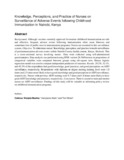Knowledge, Perceptions, and Practice of Nurses on Surveillance of Adverse Events following Childhood Immunization in Nairobi, Kenya
Date
2016-12-19Author
Masika, Calistus Wanjala
Atieli, Harrysone
Were, Tom
Metadata
Show full item recordAbstract
Background. Although vaccines currently approved for routine childhood immunization are safe and effective, frequent adverse events following immunization often cause illnesses and sometimes loss of public trust in immunization programs. Nurses are essential in this surveillance system. Objective. To determine nurses’ knowledge, perception, and practice towards surveillance of postimmunization adverse events within Nairobi County health centers, Kenya. Methods. This is a cross-sectional survey involving nurses . Data were collected using self-administered questionnaires. Data analysis was performed using SPSS version 20. Differences in proportions of categorical variables were compared between groups using chi-square tests. Binary logistic regression model was used to compute independent predictors of outcome. Results. 29.2%, 32.1%, and 45.3% of the respondents had good knowledge, good practices, and good perceptions on AEFI surveillance, respectively. Respondents with diploma or degree nursing training level were 1.8 times and 2.5 times more likely to have good knowledge and good perception in AEFI surveillance, respectively. Nurses with previous AEFI training were 9.7 times and 1.8 times more likely to have good AEFI knowledge and practices, respectively. Conclusion. There is a need to train and mentor nurses on AEFI surveillance. Findings of this study will be valuable in informing policy review on childhood immunization programs.
URI
https://doi.org/10.1155/2016/3745298https://www.hindawi.com/journals/bmri/2016/3745298/
http://r-library.mmust.ac.ke/123456789/1566
Collections
- Gold Collection [1026]

